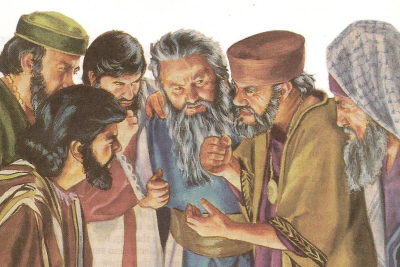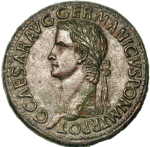
The Question
He seemed unstoppable. Every question was answered perfectly. Try as they might, the ultra-strict, highly educated Jewish Pharisees were unable to trap Jesus. No theological question seemed too difficult for Him. Every answer demonstrated wisdom, revealing their own ignorance to the crowds.
Then a thought struck the Pharisees. Was it really that simple? Could it really work? It seemed so obvious, and yet so impossible to answer. No matter what Jesus said, he could never get out of the question.
But this question required the alliance of their worst enemies. The Pharisees – committed to pure Jewish living – looked at their Roman invaders with scorn and disdain. Worse than the Romans was the family of Herod, that semi-Jewish dynasty currently tyrannizing Judea. And worst of all were the Herodians, the Jewish traitors who supported those pagan rulers!
Still, the Herodians must assist. Whatever answer Jesus gave, he certainly could not satisfy both. It seemed strange for the Pharisees and Herodians to do anything together, but as we know, war makes strange bedfellows. Besides, these two factions were united together in their opposition to the upstart Jewish Rabbi.
They came as a group together, a strange alliance, the far-right Pharisees and the far-left Herodians, Jewish purists and Pagan enthusiasts, united by a common desire to remove their foe.
“Teacher,” they began (for they must not make their aim too obvious), “we know that You are true, and teach the way of God in truth; nor do You care about anyone, for You do not regard the person of men.”

A Roman Denarius from the time of Jesus
And now, it was time for the stumper: “Tell us, therefore, what do You think? Is it lawful to pay taxes to Caesar, or not?”
They listen intently, eagerly, hardly daring to draw a breath.
“Why do you test Me, you hypocrites? Show Me the tax money.”
As they fumbled around for the small Roman coin, they could not help but smile. True, he just called them hypocrites, but who cared? He could hardly escape the question.
In a moment he would reveal himself as a traitor, committed to Roman imperialism, ordering the people to support the Roman despots. The Pharisees would tell everyone where Jesus’ interests really lay, and it was not with the Jewish people.
Or else he would reveal himself as a Jewish nationalist, committed to independence, determined to overthrow the Roman yoke. That may be a popular message, but it would be enough to get him convicted of treason against the Roman government. And as the Herodians knew, there was only one punishment for traitors: crucifixion.
As they hand him the coin, Jesus fingers the money. “Whose image and inscription is this,” he asks, rubbing the sketch of Caesar’s face engraved on the metal.
They said to Him, “Caesar’s.”
And He said to them, “Render therefore to Caesar the things that are Caesar’s, and to God the things that are God’s.”
The force of his words hit them all with a clarity they never imagined. How many times had they read in the law of Moses, that man was created in the image of God? How many times had they also fingered the image of Caesar, stamped on the coin? But never before had they drawn this connection – that just as Caesar’s image is stamped on the coin, so God’s image is stamped on themselves. Their money may be meant for Caesar, but their lives were meant for God.
Matthew 22:15-22. Image source: https://commons.wikimedia.org/wiki/File:Caligula_RIC_0033_heads.png



